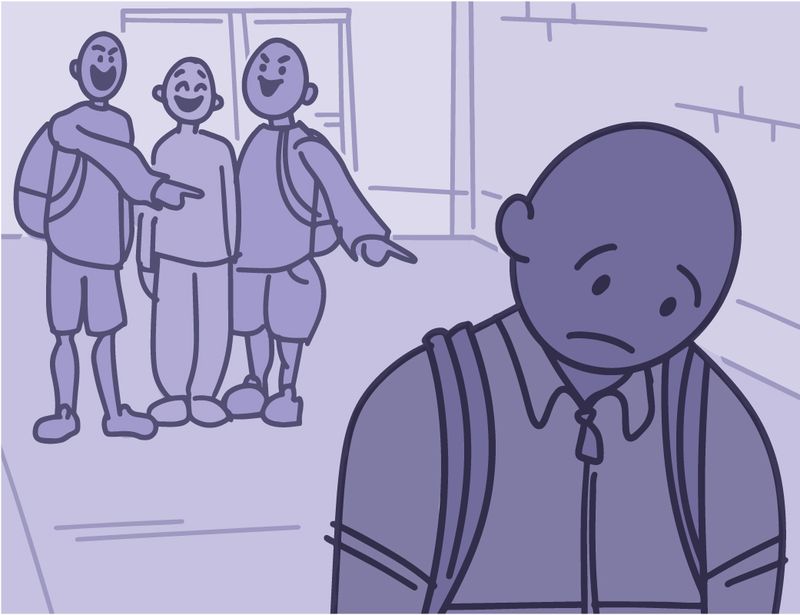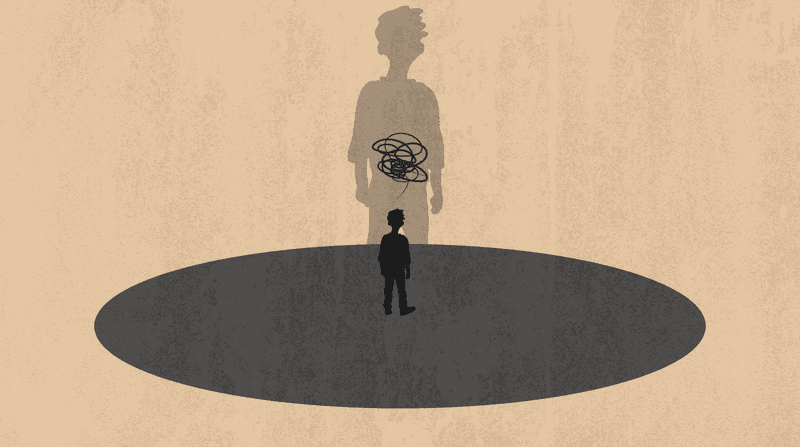Childhood bullying leaves lasting scars that often follow individuals into adulthood. These remnants can manifest in subtle, yet profound ways, affecting relationships, self-worth, and identity.
From trust issues to self-criticism, the impact of early bullying is pervasive, shaping adult behavior and thoughts in unexpected ways.
1. Struggling to Trust Others
Trust, a fundamental building block in relationships, is often compromised in adults who experienced bullying as children. These individuals may find themselves questioning the intentions of even the closest friends.
The fear of betrayal looms large, leading to guarded interactions. This struggle can make forming new relationships challenging, as letting others in feels like a risk.
Building trust requires vulnerability, something that might have been exploited in their past. Despite these challenges, recognizing this pattern is the first step towards healing and opening up to genuine connections.
2. Overanalyzing Social Interactions
For those who faced bullying, every social interaction can become a puzzle to decipher. They might replay conversations in their minds, searching for hidden meanings or signs of disapproval.
This over-analysis stems from a history of being scrutinized and judged harshly by peers. The relentless self-questioning can lead to anxiety, as they strive to ensure they didn’t offend or misstep.
Ironically, this habit can make socializing exhausting, as the mental gymnastics overshadow the joy of connection. Learning to trust their instincts and accept imperfections can release them from this cycle.
3. Evitar el conflicto a toda costa
Conflict is a natural part of life, but for those who were bullied, it can feel like a threat. These individuals may go to great lengths to avoid disagreements, fearing the emotional turmoil it brings.
Their past experiences taught them that conflict often led to hurtful situations. As adults, they might prioritize harmony over expressing personal needs, risking their well-being.
Avoidance might seem like a safe choice, but it often leads to unaddressed issues festering beneath the surface. Embracing conflict as a means to resolution can be a liberating shift.
4. Constant Self-Criticism
Self-criticism is a common companion for adults who faced bullying, as they internalize the negative voices from their past. The echoes of hurtful words shape their inner dialogue, leading to harsh self-judgment.
This perpetual critique can undermine confidence, causing them to shy away from opportunities or personal growth. They might magnify their flaws, while overlooking achievements.
Recognizing the origins of this critical voice is crucial. With time and effort, they can reframe their self-talk into a more compassionate, supportive narrative, ultimately fostering a healthier self-image.
5. Difficulty Asserting Boundaries
Setting and asserting boundaries can be particularly daunting for those who were bullied as children. The fear of confrontation or rejection often deters them from protecting their personal space and needs.
As children, their boundaries were frequently ignored, leaving them feeling powerless. In adulthood, this can manifest as acquiescence to others’ demands, even at a personal cost.
Learning to articulate and maintain boundaries can be empowering. It allows them to prioritize their well-being, fostering respect in their relationships. This skill, though challenging, is essential for healthy interactions.
6. Seeking Approval Excessively
The need for approval can become all-consuming for adults who were bullied, as they strive to validate their worth through others’ perceptions. This constant quest often stems from past experiences where they were made to feel inadequate.
Such individuals may go above and beyond to gain praise, sometimes at the expense of their own needs or values. This behavior can lead to burnout, as their self-worth becomes contingent on external validation.
Realizing that their value isn’t solely tied to others’ opinions is vital. Developing an intrinsic sense of self-worth can liberate them from the approval-seeking cycle.
7. Fear of Being Judged
A lingering fear of judgment can shadow adults who experienced bullying, as they anticipate criticism in every social setting. This apprehension often stems from past ridicule, leaving them self-conscious and wary.
The fear can be paralyzing, leading to avoidance of new experiences or opportunities. They might censor their words or actions, striving to fit in or go unnoticed.
Overcoming this anxiety involves embracing authenticity and self-acceptance. By gradually exposing themselves to situations that challenge their fears, they can build resilience and confidence in their unique identity.
8. Tolerating Toxic Behavior
For some adults who were bullied, enduring toxic behavior becomes an unfortunate norm. The mistreatment they faced as children might have blurred the lines of acceptable behavior, making them tolerant of negativity.
In relationships, they may overlook harmful patterns, believing they deserve such treatment or that it’s typical. This tolerance can perpetuate cycles of unhappiness and harm.
Recognizing toxic dynamics is the first step towards change. Empowering themselves with self-worth and the courage to demand respect can lead to healthier, more fulfilling relationships.
9. Shying Away from Leadership Roles
Leadership roles may seem daunting for those who were bullied, as they associate such positions with potential scrutiny. The fear of failing or being criticized might deter them from stepping into the limelight.
This reluctance is often rooted in past experiences where their confidence was shattered. In adulthood, they might underestimate their capabilities, avoiding opportunities to lead or influence.
Embracing leadership involves shifting focus from fear to growth. By recognizing their strengths and potential, they can build the confidence needed to guide and inspire others.
10. Minimizing Accomplishments
Despite achieving significant milestones, adults who faced bullying often downplay their successes. The critical voices from their past overshadow their achievements, leaving them reluctant to celebrate.
They might fear appearing arrogant or drawing unwanted attention. This habit can hinder their ability to fully embrace their potential and progress.
Learning to acknowledge and appreciate their accomplishments involves challenging these ingrained beliefs. By allowing themselves to revel in their success, they can foster a positive self-image and inspire others along the way.
11. Feeling Like an Outsider
A pervasive sense of being an outsider can haunt adults who were bullied, as they struggle to find where they truly belong. This feeling often stems from past exclusion or ostracism.
The perception of not fitting in can lead to loneliness or isolation, as they grapple with self-doubt and insecurity. Social interactions might feel daunting, feeding into the belief that they’re fundamentally different.
Finding communities that share similar values or interests can provide a sense of belonging. Embracing their uniqueness as a strength rather than a weakness can help them connect more authentically with others.
12. Social Anxiety in Groups
Social gatherings can become overwhelming for adults who experienced bullying. The fear of judgment or ridicule creates a barrier to engaging in groups, leading to heightened anxiety.
In such settings, they might feel exposed and vulnerable, anticipating negative attention or criticism. This anxiety can inhibit their ability to relax and enjoy the moment.
Overcoming social anxiety involves gradual exposure and building confidence in social skills. By focusing on building genuine connections rather than perceived threats, they can gradually ease their discomfort in group settings.
13. Sabotaging Close Relationships
Unconsciously sabotaging close relationships can be a defense mechanism for adults who were bullied. The fear of vulnerability and potential hurt can lead them to push loved ones away.
This behavior often stems from a deep-seated belief that they are unworthy of love or that intimacy will inevitably lead to pain. As a result, they might self-sabotage, whether through excessive demands or emotional withdrawal.
Recognizing this pattern is crucial for breaking the cycle. By fostering open communication and self-compassion, they can nurture healthier, more fulfilling relationships.
14. Perfectionism as a Shield
Perfectionism can become a protective shield for adults who faced bullying, as they strive to control their environment and outcomes. The fear of criticism drives them to excel, often at the cost of their well-being.
This relentless pursuit of flawlessness can lead to burnout, as they place immense pressure on themselves to meet impossibly high standards. The underlying belief is that perfection will shield them from judgment.
Challenging the need for perfection involves embracing imperfections and valuing progress over perfection. By shifting focus to learning and growth, they can reduce stress and enhance self-acceptance.
15. Trouble Accepting Compliments
Receiving compliments can be uncomfortable for adults who were bullied, as praise often contradicts their internalized negative self-image. They might dismiss or deflect compliments, feeling unworthy of positive acknowledgment.
This discomfort stems from a history of being belittled or criticized, leading them to doubt the sincerity of kind words. As a result, they might struggle to accept or believe compliments.
Learning to graciously accept compliments involves challenging these ingrained beliefs. By practicing self-compassion and allowing themselves to feel deserving, they can gradually embrace positivity and build self-esteem.
16. Keeping Emotions Hidden
For those who experienced bullying, emotions can become a guarded secret, safely tucked away to avoid vulnerability. Expressing feelings might have been met with ridicule in the past, leading to emotional suppression.
As adults, they might struggle to articulate emotions, fearing judgment or misunderstanding. This emotional bottling can strain relationships, as loved ones find it challenging to connect on a deeper level.
Gradually opening up to trusted individuals can help them break free from this pattern. By allowing themselves to feel and express emotions, they can foster deeper connections and emotional well-being.
17. Intense Fear of Rejection
The fear of rejection can be paralyzing for adults who were bullied, as past experiences of exclusion leave deep scars. This fear can inhibit them from pursuing romantic or professional opportunities.
The anticipation of being turned away or dismissed often looms large, leading to self-doubt and hesitation. They might avoid situations that could result in rejection, limiting their growth.
Facing this fear involves building resilience and self-worth. By reframing rejection as a natural part of life, they can approach new experiences with courage and learn from each encounter.
18. Becoming the “Bully” in Disguise
Irónicamente, some adults who were bullied might adopt bullying behaviors themselves, a defense mechanism to prevent being hurt again. This shift can manifest as controlling or critical behavior towards others.
The fear of vulnerability or being perceived as weak might drive them to assert dominance in relationships or workplaces. However, this approach often alienates others, perpetuating a cycle of isolation.
Recognizing these tendencies is the first step to change. By cultivating empathy and addressing their own pain, they can transform past traumas into opportunities for growth and compassion.



















